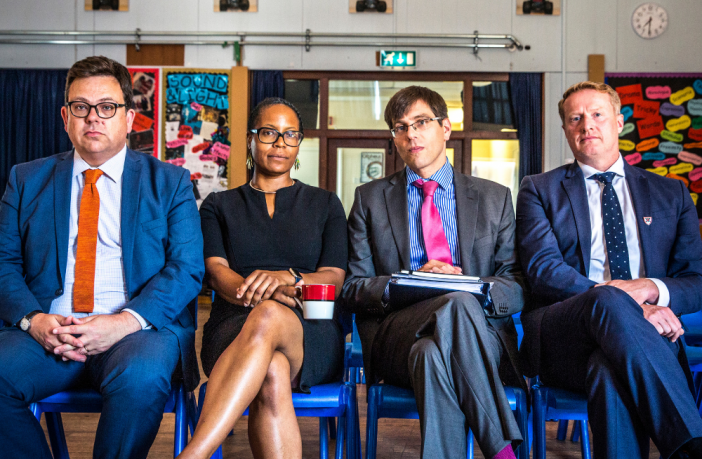Why can teachers no longer just be teachers? What are the human impacts of budget cuts on today’s school children? Is pastoral care an important part of a student journey or a symptom of the snowflake era? These are all issues uncovered following the first episode of School last week – questions then put to academic advisers on the series, some of the leading experts in their field.
Meet Clare Woodward, Jane Cullen and Clare Lee from the OU’s Faculty of Wellbeing, Education, and Language Studies (WELS) all chosen for their ability to advise on the subject of the programme:

Claire Woodward, Lecturer in International Education

Jane Cullen, Programme Lead, Taught Postgraduate Studies.

Clare Lee, Chair of EE830 Learning and Teaching: educating the next generation.
What are the potential long-term impacts of budget cuts on schools, when urgently needed pastoral care is likely not to be offered? How connected are pastoral care and support for students and their academic success?

Claire Woodward, Lecturer in International Education
“In episode 1 of School you may have heard a teacher say that students just want to know that teachers are available and listening to them. Effective academic learning within a school context cannot be separated from effective pastoral care.
“There is recognition in schools that pastoral care and academic progress are linked. The various elements of a person’s life – physical, emotional, cognitive and social – cannot realistically be treated in isolation. So what happens in one area will inevitably effect what happens in the others.
“A commitment to academic success should be accompanied by a commitment to pastoral care. Clear two-way communication and early intervention in identifying and addressing problems are vital as a student who receives good support in dealing with the problems of everyday life is more likely to have the energy and will to do well in their studies. By allowing student support to take a heavy hit from budget cuts there is a strong possibility that learners’ academic success will be affected.”
What about funding for academy trust staff? Does this take away from funding for ‘frontline’ school teachers?

Jane Cullen, Programme Lead, Taught Postgraduate Studies.
“Inevitably an extra layer of management in schools can take away from funding for ‘frontline’ teachers. However, that said, it doesn’t necessarily mean that this is excessive, or that the alternative of all staff only attached to one school would be of more benefit.
“There’s a rationale that says it makes sense to have, for example, someone who has responsibility for all the school buildings, for organising catering across several schools, and it makes sense to have someone who can work across several schools to share teaching expertise, take responsibility for all the professional development needs of staff etc.
“However, it certainly seems the case in the Castle School Education Trust that those in senior management working across the trust are those with the highest salaries. Trusts have to publish accounts each year, and the CEO is the person in the CSET trust with the highest salary – in the £110,000-£115,000 bracket. CSET may well argue that even if those working across the trust earn the highest salaries this represent a saving from having someone in the same sort of role at each of seven schools.
“The problem is – even if it’s sometimes only a perceived problem – that those people in senior management roles working across several schools can seem too far removed from the real, messy, time-consuming work of teaching and learning and the complexities of the development of children and young people, and that it’s too easy to adopt a ‘spreadsheet’ approach to education.”
Why are teachers on performance-related pay? Good teaching is a tiny amount of learner outcomes. Do target grades get reduced as pastoral support gets cut?

Jane Cullen, Programme Lead, Taught Postgraduate Studies.
“One answer is that performance-related pay recognises and rewards good teaching. The neutral argument is that it helps motivate the individual teacher to focus on what will, in the long term, most help the students.
“So across a school it becomes an incentive for any teacher already receiving it and for teachers who have not yet managed to. As well, let’s not forget the continued interest of families – as well as policymakers – in the league tables, the proportion of top grades achieved within a school, the pressure on schools to continually improve their performance. For parents and guardians, examination performance is a typical way into understanding how well a school is doing.
“There wouldn’t be any necessary correlation between target grades and the levels of pastoral care. As we will see from episodes in School, it is bad news for one school in the trust to perform significantly worse than others or for GCSE performance to go down in a school from one year to the next – and that’s in the context of significant cuts in pastoral support. ”
Why can teachers no longer be just teachers? They’re now expected to be social workers parents, counsellors and business minded? And for the same or little pay.

Jane Cullen, Programme Lead, Taught Postgraduate Studies.
“I think every teacher in the world be nodding their head to a question like that – though at the same time they’d probably be worrying over how to help one of the kids in the class. Governments – of all political colours – have heaped more and more responsibilities on to teachers.
“Some of that is about the way the world is now – more pressures on children and young people to get qualifications and for employment, perhaps more complex and sometimes fragmented family lives.
“Some of it is simply that the classroom and school are places where young people are spending much more of their time than they used to. Teachers can sometimes come across as a bit cynical, but teaching is a values-led profession and your average teacher is a caring academic. And every teacher will tell you that no-one goes into education to make money.”
There are lots of comments on social media about snowflakes and molly coddled children and that good old fashioned discipline is needed? Is it really as simple as that?

Jane Cullen, Programme Lead, Taught Postgraduate Studies.
“No it’s not! In the 1980s only about 1 in 10 students achieved 3 A Levels; In 1990 most students taking GCSEs would ‘fail’ them – i.e achieve lower than a C grade. Arguably in that old-fashioned world it was okay to fail exams.
“The world has changed and the pressures on young people are increasing all the time – we’ve seen that in the first episode of School. We’re getting better in education about recognising the struggles in coping with these pressures – and as we see in School it’s staff in the schools who are trying to make the adjustments so that young people under pressure can succeed.”
School follows the intimately connected experiences of pupils, teachers, parents and school leaders, across an academic year, in all their complexity. A co-production between BBC Two and The Open University, the six-part series shines a spotlight on the school system, financial pressures and their human impact. Watch the next episode of School or catch up on iPlayer.
Find out more:
- Follow the #School hashtag and join the conversation
- Find out more about the TV series and enjoy free educational resources via OpenLearn



